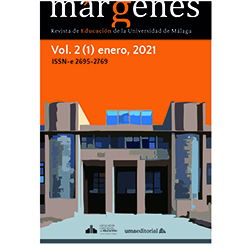In the house of the desire. Preface to a philosophy of education
DOI:
https://doi.org/10.24310/mgnmar.v2i1.11555Keywords:
philosophy of education, desire, poetics, theoryAbstract
The philosophy of education is not a discipline, but a subject installed in a library, in a series of readings and texts that, in teaching, understood as an act of transmission, composes a course, to give to read, to give to think and write, to allow a conversation. But it is also education: an encounter between generations in the filiation of time. Philosophy (of education) has to do with love, with a kind of increased hunger that does not want to be fully satisfied, and with desire, with the house of desire. Desire not for knowledge, but for wisdom, one that brings us pleasure and pain, one that leads a life and gives it shape. This is the starting point here. My starting point as a teacher to think about a philosophy of education. However, despite that pain that sometimes crosses us, or that plunges the friend into the abyss, there is a last sense in which education, thought philosophically (perhaps as a kind of poetic and as a beautiful melody) he insistently reminds us of the most important law of education ever written by the gods: "Don't worry", "Nothing happens", "I'm with you", "Everything is fine." These expressions contain the essence of the pedagogical promise. We promise the impossible. We look for and desire the impossible, because hope never dies and it connects us with life, because the possible already is. And we do it through Eros, which is sweet and bitter, which is health and poverty, and we learn, in love, to inhabit the house of desire.
Downloads
Metrics
References
Alba Rico, S. (2015). Leer con niños. Literatura Random-House.
Arendt, H. (1996). Entre el pasado y el futuro. Península.
Gusdorf, G. (2019). ¿Para qué profesores? Por una pedagogía de la pedagogía. Miño y Dávila Editores.
Larrosa, J. (2020). El profesor artesano. Materiales para conversar sobre el oficio. Laertes. Larrosa, J. (2019). Esperando no se sabe qué. Sobre el oficio de profesor. Candaya. Larrosa, J. y Rechia, K. (2018). P de profesor. Novedades Educativas.
Simons, M. y Masschelein, J. (2014). Defensa de la escuela. Miño & Dávila.
Downloads
Published
How to Cite
Issue
Section
License
The editorial team of Márgenes supports an open Access policy of scientific knowledge. apostamos claramente por una política de acceso abierto del conocimiento científico (see Berlin Declaration).
Authors with work published in this journal accept the following conditions:
- This journal provides immediate free access to its content under the principle of making research freely available to the public. All contents published in Márgenes are subject to the Creative Commons Reconocimiento-SinObraDerivada 4.0 Internacional
It is the responsibility of the authors to obtain the necessary permissions of the images that are subject to copyright.
Authors whose contributions are accepted for publication in this journal will retain the non-exclusive right to use their contributions for academic, research and educational purposes, including self-archiving or deposit in open-access repositories of any kind.
The electronic edition of this magazine is edited by the Editorial of the University of Malaga (UmaEditorial), being necessary to cite the origin in any partial or total reproduction.
- Authors can enter into other additional independent contractual agreements for the non-exclusive distribution of the version of the article published in this journal (e.g. including it in an institutional repository or publishing it in a book) on the condition that they clearly indicate that the work was originally published in this journal.
- Authors are allowed and recommended to publish their work on the Internet (for example on institutional and personal websites), before and after the publication, as this could lead to constructive exchanges and a more extensive and quick circulation of published works (see The Effect of Open Access).














